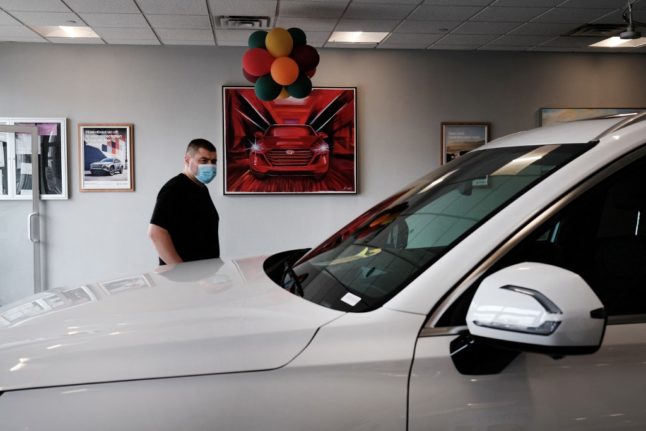Getting your hands on a car – new, second hand, or even rental – is becoming much harder and more expensive in Spain.
The car industry has been hit by a perfect storm of conditions that have made new cars harder to come by and, as a result, caused prices to rapidly increase.
According to Spain’s main consumer organisation, Organización de Consumidores y Usuarios (OCU), the microchip crisis affecting the entire globe, combined with an overall increase in the price of materials needed for car manufacturing and increased carbon emissions legislation has created a shortage of new cars in the country.
New cars
With less cars being manufactured, prices of new cars have gone up: a recent OCU report reports that new car prices have increased by 35 percent, higher even than Spain’s record breaking inflation levels in recent months.
READ ALSO: Rate of inflation in Spain reaches highest level in 37 years
It is a shortage of microchips and semiconductors – a global problem – that has caused car production in Spain to plummet. In the first eight months of 2021, for example, production fell by 25.3 percent compared to 2019.
This is not a uniquely Spanish problem, however. The entire world is experiencing a shortage of semiconductor microchips, something essential to car manufacturing as each car needs between 200 to 400 microchips.
France’s car exports, for example, have fallen by 23.3 percent, Germany’s by 27 percent, and the UK’s by 27.5 percent.
Simply put, with less cars being produced and specialist and raw materials now more expensive, the costs are being passed onto consumers the world over.
Equally, these industry-specific problems were compounded by the COVID-19 pandemic.The average wait for a car to be delivered in Spain is now around four months, double what it was before the pandemic, and depending on the make and model you buy, it can be as long as a year.
Car dealerships across Spain were forced to sell cars during the pandemic to stay afloat, and now, when consumers want to purchase new cars, they don’t have enough to sell and can’t buy enough to keep up with demand due to the materials shortages that have kneecapped production.
Second-hand cars
With the scarcity and increased prices in the new car market, the effect is also being felt in the second-hand car market too. With many in Spain emerging from the pandemic facing precarious financial situations, then compounded by spiralling inflation in recent months, one would assume many would go for a cheaper, second hand option.
Yet, even second-hand prices are out of control. In Spain, the price of used cars have risen by 17 percent on average so far in 2022.
Cars 15 years old or more are 36 percent more expensive than they were in the first half of last year. The average price of a 15 year old car is now €3,950 but in 2021 was just €2,900 – a whopping increase of 36 percent.
As production has decreased overall, purchases of used models up to three years old have declined by 38.3 percent. Purchases of cars over 15 years old, on the other hand, have surged by 10.4 percent.
If you’re looking to buy a second-hand car in Spain, keep in mind that the reduced production and scarcity of new models is causing second-hand prices to shoot up.
Rental cars
These problems in car manufacturing have even passed down to car rentals and are affecting holidaymakers in Spain.
Visitors to Spain who want to hire a car will have a hard time trying to get hold of one this summer, unless they book well in advance and are willing to fork out a lot of money.
Over the past two years, since the start of the Covid-19 pandemic, there has been a shortage in rental cars in Spain. However, during peak holiday times such as Easter, the issue has been brought to the forefront.
It’s now common in Spain to see car rental companies hanging up signs saying “no hay coches” or no cars, similar to the no vacancy signs seen in bed & breakfasts and hotels.
READ ALSO: Why you now need to book a rental car in advance in Spain
While all of Spain is currently experiencing car rental shortages, the problem is particularly affecting areas of Spain with high numbers of tourists such as the Costa del Sol, the Balearic Islands and the Canaries.
According to the employers’ associations of the Balearic Islands, Aevab and Baleval, there are 50,000 fewer rental cars across the islands than before the pandemic.
In the Canary Islands, there is a similar problem. Occupancy rates close to 90 percent have overwhelmed car rental companies. The Association of Canary Vehicle Rental Companies (Aecav) says that they too have a scarcity 50,000 vehicles, but to meet current demand, they estimate they would need at least 65,000.
According to Spain’s National Statistics Institute (INE), fewer than 20 million foreign tourists visited Spain in 2020 and revenues in the sector plummeted by more than 75 percent. While numbers did rise in 2021, the country still only welcomed 31.1 million foreign visitors last year, well below pre-pandemic levels and far short of the government’s target.
Many Spanish car rental companies have admitted that the fleet they offer is down to half after selling off vehicles in the pandemic due to the lack of demand.
End in sight?
With the microchip shortage expected to last until at least 2023, possibly even until 2024, it seems that the best course of action if you’re looking to buy a new or used car in Spain is to wait, let the market resettle, and wait for prices to start going down again.
If you’re hoping to rent a car when holidaying in Spain, be sure to book well in advance.



 Please whitelist us to continue reading.
Please whitelist us to continue reading.
It’s not “less cars”, it’s “fewer cars”. I’m a pedant.